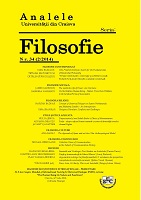DESPRE SINUCIDERE ÎN MODERNITATE: ÎNAINTE ŞI DUPĂ TEORIA LUI HENRI BERGSON ŞI ALBERT CAMUS
ABOUT SUICIDE IN MODERNITY: BEFORE AND AFTER HENRI BERGSON AND ALBERT CAMUS’ THEORY
Author(s): Ana BazacSubject(s): Ethics / Practical Philosophy, Social Philosophy, Phenomenology, Ontology
Published by: Editura Universitaria Craiova
Keywords: suicide; modernity; Kant; Spinoza; Heidegger; Bergson; Camus; Sartre;
Summary/Abstract: The paper emphasises some philosophical standpoints (phenomenology, ethics, ontology and social philosophy) concerning suicide: the modern times being the most fruitful just because they facilitate the constitution of the ontological arguments. After discussing Heidegger and Sartre’s images about death as the genus proximum of suicide, the differentia specifica is analysed through the ethical formalism of Kant and the ontological inquiries of Spinoza, Bergson and Camus. Indeed, the latter are considered as constituting the landmark of the modern explanation of suicide: by detaching from the moralistic rejection of suicide and, at the same time, by privileging the worth of life for the human freedom. The last chapter shows the absurd contradiction between this worth and the present real phenomena worldwide.
Journal: ANALELE UNIVERSITĂȚII DIN CRAIOVA. SERIA FILOSOFIE
- Issue Year: 1/2014
- Issue No: 33
- Page Range: 71-106
- Page Count: 36
- Language: Romanian

